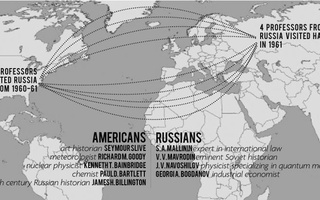STUDYING THE SOVIETS
To meet student interests, Harvard had created a regional studies program focusing on the Soviet Union during the Second World War.
The two-year masters program offered courses that aimed to provide students with a background in the history, cultures, languages, and politics of the U.S.S.R. and Eastern Europe.
Courses offered under the program included “The Soviet Political System” and Sysyn’s “The Other Europe: A Cultural History Of Eastern Europe.”
Lubomyr Hajda, who became the program’s academic coordinator in 1978, recalled a growing applicant pool that reached between 75 to 100 interested students in certain years.
Students showed marked enthusiasm toward the Solidarity movement in Poland, Czech writers who spoke of autonomy and dissidence, and emigration rights of Jewish Soviet citizens, Sysyn said.
According to Sysyn, funds from Washington supported the study of critical languages, namely Russian and Eastern European tongues, after the U.S.S.R’s development of the atomic bomb and deployment of Sputnik shocked the United States.
Meanwhile, nationalist groups hoping to preserve their cultures funded the study of European countries that had been swallowed by the Soviet Union.
THE LIMITS OF EXCHANGE
in addition to new paths of study on campus, Harvard worked to offer opportunities abroad. In 1988, the Harvard Center For International Affairs’ Student Council organized a Harvard-Soviet student exchange.
The trip allowed 12 undergraduates, one graduate delegate, and one professor to travel to Moscow, Kiev, Leningrad, and Prague.
In conferences at Kiev State University, U.S. and Soviet students discussed concepts such as nationality and the American Dream.
A group of 12 soviet students also visited Harvard the following fall.
At the time, however, Harvard affiliates benefiting from the direct exchange with the U.S.S.R. still questioned the impact of these programs.
Anna V. E. Forrester ’88, one of the students in the group, recalled being skeptical of the effects of Soviet leader Mikhail Gorbachev’s recent perestroika and glasnost policies promoting openness, transparency, and democracy.
Read more in News
On the Losing Team: Harvard Plays for Dukakis in 1988 ElectionRecommended Articles
-
The ‘Wall’ in their Own WordsA generation of post-Soviet literary figures write essays and fiction on life in the Bloc
-
Illusions in the MotherlandAs the host of the 2014 Winter Olympics, Russia will find it difficult to close the door on the glimpse Vancouver has provided of a fake superpower with an ego problem.
-
Estonian President Addresses Kennedy SchoolPresident of Estonia Toomas H. Ilves discussed the relationships between the EU and NATO, and between Estonia and the Soviet Union yesterday at the Harvard Kennedy School.
-
Bezmozgis Offers Uninspired Take on Immigrant ExperienceFor a few decades in the middle of the last century, American fiction featured a strong Jewish voice, world-weary yet wisecracking, in which unconcern—even disgust—toward the world coexisted with fascination with its linguistic and philosophical possibilities. With his existential emphasis, the Jew became the everyman; though the Jewish immigrant now rarely appears as a novelistic protagonist, a great nostalgia for his brand of schmerz persists.
-
 Despite Tensions, Professors Cross Iron Curtain
Despite Tensions, Professors Cross Iron Curtain -
Mitt Romney’s RussiaRomney appears to cling to the implicit assumption that a post-Soviet Russia still poses the gravest danger to American interests.













